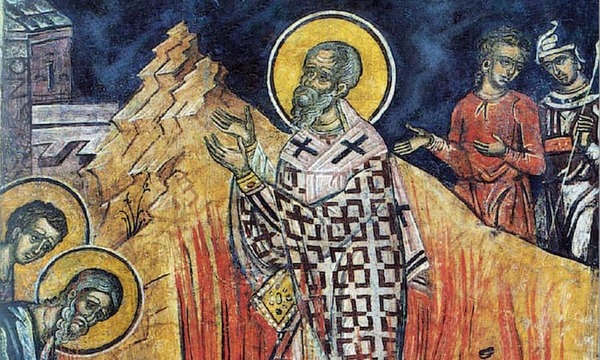The Canaanite destruction is the major ethical problem in the Old Testament. How can we serve a God who commanded genocide? As we saw in the previous posts on Midian, Amalek, and the Canaanites, the individuals and families who follow YHWH and become part of Israel are on one extreme of a spectrum (the Caleb end), while those who attack Israel are located on the other extreme (the Amalek end). The groups place themselves on the spectrum by means of their treatment of Israel and their attitude toward YHWH. A nation like Edom that neither helped nor attacked Israel would be near the middle of the spectrum, incurring YHWH’s displeasure but not a divine command for extermination. Although a nation like Midian might be placed on the Amalek end of the spectrum, individuals and families from Midian could turn to follow YHWH and place themselves on the Caleb end of the spectrum. In the case of Egypt, an entire nation could move on the spectrum, depending on their attitude toward Israel.
The implication of this pattern is that individuals from other nations, including Canaanites, could have turned to follow YHWH and been preserved. The book of Joshua never indicates that the Israelites presented this option to the Canaanites, but the preservation of Rahab implied that they honored such testimonies by those who helped them. The early Jewish interpreters believed this was the case. Wisdom of Solomon 12:10 says that the conquest happened gradually in order to give the Canaanites time to repent (although it also claims that the Canaanites would never change). Mid. Deut. V.13 notes a parallel with Sihon, the Amorite king. YHWH commanded Moses to fight Sihon, but Moses’ first action was to send messengers of peace to Sihon (Deut 2:24–26). Therefore, even though YHWH commanded the destruction of the Canaanites, the Israelites should still have sent messengers of peace. The Midrash even speculated that the Girgashites left Canaan when Israel arrived and went to Africa (Mid. Deut. V:14; see also Jubilees 10:27-34). Hebrews declares that the Canaanites were disobedient, implying that they knew how YHWH wanted them to act and rejected his commands (11:31).
Such a reading that allows for Canaanites to follow YHWH would appear to conflict with the frequent commands to place the Canaanites under the ban (Deut 7:1–2; 20:16–18). However, further clarity might be achieved by categorizing three possible responses to Israelite advances. First, their enemies could resist them forcibly. When Israel was victorious against cities far away they were to put the men to death and take everything else as spoil (Deut 20:12–14). For conquered cities in the land of Canaan, they were to put everyone under the ban (Deut. 20:16–18). Second, their enemies could submit before battle to the Israelites, recognize the greatness of YHWH, but continue to worship their own gods. For cities far away, Israel was to make them slave labor. However, for cities in Canaan Israel was to place them under a ban, exactly the same as if they had fought Israel. Third, their enemies could proclaim the greatness of YHWH and help the Israelites. Although Deuteronomy does not offer any regulations concerning these cases, the narratives concerning Jethro, Caleb, and Rahab imply that these people were to be incorporated into Israel, regardless of whether they were from Canaan or a more distant land. In contrast to the second option, those who took this path would turn away from their former gods and serve YHWH. This option is also supported by the frequent purpose clauses for the destruction of the Canaanites as the danger their religious service would bring to the Israelites (Deut. 7:4–5, 25–26; 20:18). The danger was not the Canaanites as people, but their devotion to gods other than YHWH.
Regardless of the accuracy of this speculation concerning the Canaanites, Israel’s election did not automatically entail the condemnation of the other nations. Like YHWH promised to Abraham, in general he blessed those nations that blessed Israel, while he cursed the nations who attacked them. However, their choices did not imply permanence in YHWH’s disposition toward them, as individuals or other parts of the group could act differently and consequently be viewed differently by YHWH.
These posts are an abstract of a published article; see there for more details:
Trimm, Charlie. “Did YHWH Condemn the Nations When He Elected Israel? YHWH’s Disposition toward Non-Israelites in the Torah.” Journal of the Evangelical Theological Society 55 (2012): 521–36.
 Biola University
Biola University



